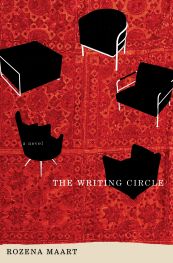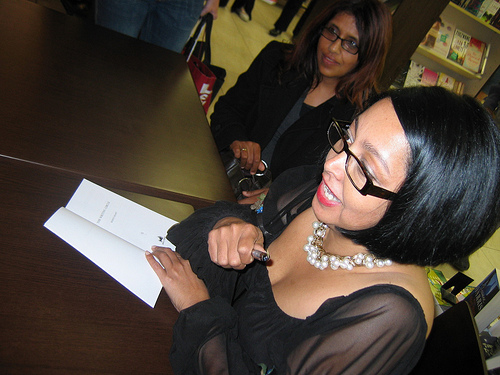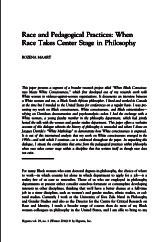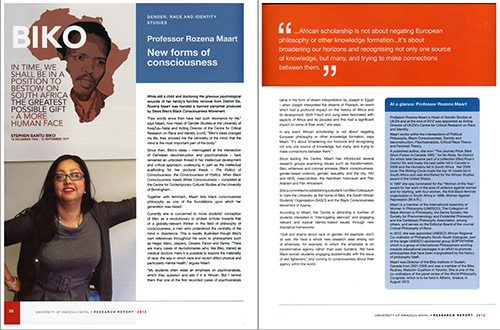All posts by Rozena Maart
Rozena Maart in Conversation with
Rozena Maart in Conversation with
Sabine Broeck
Rozena Maart in Conversation with
Jane Anna Gordon
An open letter to the Collegium for African American Research
[CAAR] 2015 organisers
An Open Letter to the organisers of the second International Girls Studies
Association [IGSA] conference at Notre Dame.
Black Feminism in the 1980s
Race and Pedagogical Practices: When Race Takes Center Stage in Philosophy
Research Report UKZN

The Writing Circle–latest fiction
ANOTHER NOMINATION FOR THE WRITING CIRCLE
The African Studies Association honours African women writers by shortlisting then choosing a winner for the Aidoo-Snyder Book Prize, named in honour of Ama Ata Aidoo, the celebrated Ghanaian novelist and short-story writer, and Margaret Snyder, the founding Director of UNIFEM.
The Ten finalists for 2010 are:
Ancestor Stones by Aminatta Forna (Sierra Leone) Grove Press, September 2007
Everything Good Will Come by Sefi Atta (Nigeria) Interlink Books, November 2007
Not Without Flowers by Amma Darko (Ghana), published by Sub-Saharan Publishers, 2007
The Uncertainty of Hope by Valerie Tagwira (Zimbabwe), published by Weaver Press, 2008
The House of Falling Women by Rosemary Ekosso (Cameroon), published by Langaa RPCIG, 2008
UnConfessed by Yvette Christainse (South Africa), Other Press, 2007
The Writing Circle by Rozena Maart (South Africa) Shuter, 2008
On Black Sisters’ Street by Chika Unigwe (Nigeria) Jonathan Cape Ltd, July 2009
An Elegy for Easterly by Petina Gappah (Zimbabwe), Faber & Faber, April 2009
Wanjira by Wambui B. Githoiora (Kenya) Dog Ear Publishing LLC, Feb 2008
Top Ten Recent SA Novels
Recommended Fiction From Post-Apartheid South Africa
Fiction writers in SA, as Sunshine points out, have been broadening their scope since democracy’s advent, and thus present an illuminating snapshot of the country – as long as you choose the right reads. Sunshine includes work from JM Coetzee, Zakes Mda and Sello K Duiker, plus BOOK SA members Niq Mhlongo and Rozena Maart; here are her top ten recent SA novels:
- The Cry of Winnie Mandela, by Njabulo Ndebele (2004). Under apartheid, hundreds of thousands of South African women endured long separations from men who were imprisoned, exiled, or in the migrant labor system. The novel follows four fictional women and links their lives with that of Winnie Mandela, who waited 27 years for Nelson Mandela’s release from prison. Ndebele, an educator, is former president of the Congress of South African Writers.
- Disgrace, by J. M. Coetzee (1999). A white university professor seduces one of his students and loses his job. He moves to a farm in the Eastern Cape, where his daughter is raped and he is violently assaulted. Coetzee, winner of the Nobel Prize in Literature in 2003, is one of South Africa’s best-known novelists. However, Disgrace, which won the Booker Prize, has been criticized in South Africa for perpetuating racial stereotypes.
- Dog Eat Dog, by Niq Mhlongo (2004). In the pivotal year of 1994, Dingamanzi Njomane, a poor township youth, is trying to make his way at a university in Johannesburg. Mhlongo, himself from a poor family in Soweto, is one of South Africa’s emerging young writers, concerned with the experiences of the post-apartheid generation.
- The Pickup, by Nadine Gordimer (2002). Julie Summers, an affluent white woman, begins a relationship with Abdu, an undocumented Arab immigrant, in a story that probes the growing xenophobia in South Africa. Gordimer, winner of the Nobel Prize for Literature in 1991, has been one of South Africa’s leading literary voices for half a century.
- Skinner’s Drift, by Lisa Fugard (2006). In 1997, Eva, a white South African woman who has been living abroad, returns to the family farm and discovers her dying father’s shameful secret. The novel explores themes of truth and guilt in post-apartheid society. Fugard is the daughter of South African playwright Athol Fugard, and this is her first novel.
- Thirteen Cents, by K. Sello Duiker (2000). A street child named Azure struggles to survive in the seedy underside of Cape Town. This award-winning novel is the first of two by Duiker, who was hailed as one of South Africa’s most exciting young writers before his death in 2005.
- Thirteen Hours, by Deon Meyer (2009). An American backpacker disappears in Cape Town, and detective Benny Griessel has 13 hours to save her and thwart a conspiracy that threatens the country. This new title from South Africa’s bestselling crime fiction author will be published in English in April 2010.
- Ways of Dying, by Zakes Mda (2002). Toloki is a professional mourner who makes his living by attending funerals in a violent South African city. Mda, one of South Africa’s most prominent black writers, was a renowned playwright during the apartheid years.
- Welcome to Our Hillbrow, by Phaswane Mpe (2001). In an inner-city neighborhood of Johannesburg, African immigrants and migrants from rural South Africa struggle with poverty, unemployment, and HIV/AIDS. This is the first and only work by Mpe, who was considered an up-and-coming young novelist at his death in 2004.
- The Writing Circle, by Rozena Maart (2007). In Cape Town, a member of a professional women’s writing group is raped at gunpoint in her yard. The story, told in the voices of five women, shines a light on the trauma of sexual violence in contemporary South Africa.
The Wide Expanse: Reading South Africa
Posted by Rachael Ogden, Inpress Ltd on 01 February 2010 at 09:09:56 — INPRESS, UK
In four weeks time, I’ll be taking part in a publishing tour to South Africa as a finalist with the British Council’s UK Young Publishing Entrepreneur award. Before I go, I want to answer a few questions: how do we value South African literature in this country? How and where do British readers interact with South African writing? To what extent does the industry nurture South African authors? Does our marketing do justice to their work? This blog will record my conversations and research before I leave the UK, and report on the book trade while I’m in South Africa.
Of all contemporary African literature, it is probably Nigeria’s which has loomed largest in the UK and US literary pages over recent few years, thanks largely to novelists Chimamanda Ngozi Adichie and Helen Oyeymi, who have introduced a younger generation of readers to an established literary tradition which includes luminaries Chinua Achebe, Ben Okri and Wole Soyinka. Two South Bank Shows were devoted to Nigerian literature in May 2009 (and specifically to Adichie and Achebe). Has the rise of Nigerian writing left South African authors behind?
Not so, says Daneet Steffens, well-travelled bibliophile and editor of Mslexia, the magazine for women who write. Daneet believes that the UK offers a relatively solid representation of writing from throughout the Commonwealth via publishers, bookstores and prizes. “What’s particularly exciting and vibrant about South African women writers at the moment,” she says, “is that there is a strong multi-generational and multi-ethnic presence, covering an intense and highly-charged time.”
Some of the writers who are particularly exciting to Daneet are Nadine Gordimer, Sindiwe Magona, Gillian Slovo, Pamela Jooste, Zoe Wicomb, Rozena Maart, Gabeba Baderoon and Rachel Zadok. “At a critical moment of the South African story, you’ve got a chorus of vibrant voices, contributing to a rich, all-encompassing narrative that’s still developing.”
I wonder how many of these writers are accessible to the British reading public. In my next blog, I’ll be reporting from the high street on the representation of South African authors in our bookstores.
South African Reviews of The Writing Circle–O’ Magazine, True Love and The Sowetan


Feature in TRUE LOVE, South Africa’s most widely read Woman’s Magazine

The Sowetan – The Writing Circle review
A look into the scourge of rape
03 March 2009
Book: The Writing Circle
Author: Rozena Maart
Reviewer: Lindi Obose
This book is a novel, but it is not based on fiction, but fact, as South Africa is one of the nations with the highest number of reported rape.
The book opens with a rape that occurs in front of a home in Cape Town, where five women gather every Friday night to discuss literature.
The women are waiting in the house while one of their own is being raped at gunpoint in her own yard, in her own car.
Each chapter is told in the voice of one of the women. They all recount their personal stories, revealing their reactions to the horrific events of the present and reflecting on their past experiences.
The Writing Circle is a beautifully written, heartbreaking book that allows the reader to experience an intense empathy for each woman.
The writer creates a picture so that the reader can see, hear, touch, and even smell the thing or scene talked about and describes a person so that the reader feels as though she has met the person.
It reminds us that violence against women knows no class boundaries and that people would listen to the cries of women and girls and heed the suffering that surround them and pay attention.
The writer brings difficult subject matters facing our nation today. While reading this book I realised that all the women in this book were very concerned with safety. They had people accompanying them wherever they went.
This book explains all the many different types of rape, from that of the one who was raped at gunpoint to the case of a girl who was raped by her mother’s employer. Just because a woman (or man) is dating someone, it does not give the other the right to rape them. Just because the victim knew their attacker doesn’t make it less of a rape. I highly recommend this book to everyone, men and women.
South African Book Tour

Rozena Maart, signing books at the first South African book launch of The Writing Circle, Wordsworth Bookstore, Waterfront, Cape Town, May 2008. Bridgette Dreyer, a friend from Steenberg High School, sitting close by…at the three-in-one launch of The Writing Circle, Mix It! Voices of the Bo-Kaap, and African Gold: The Story of Africa’s Nobel Laureates.
The Writing Circle has its own page. Check it for details of the book.
****************************************************************
Please contact Ayesha George–Publicity
I am taking bookings for the Fall/Autumn semester.

Cape Town Book fair
June 20, 2008 Edition 1
A RECORD 50 494 people attended the third Cape Town Book Fair (CTBF) last weekend. The four-day Fair, with the theme Words Create Worlds came to an end on Monday, having had 7 194 children through its doors at the Cape Town International Convention Centre.
The fair, run in partnership with the Frankfurt Book Fair and under the auspices of the Publisher’s Association of South Africa (Pasa), was opened amid a buzz of activity by Professor Kader Asmal on Saturday, as people rushed to collect tickets for the first events of the day.
Speaking at the opening press conference of the CTBF, Dudley Schroeder, executive director of Pasa, said: “The United Nations has released figures showing that publishing is the largest creative industry in the world. The book industry is 20 times bigger than the entire international film industry.”
Members of the public flooded the more than 400 events, entertained with Michael Poliza’s breathtaking slide presentation from his book Eyes Over Africa, inspired by Riaan Manser’s account of his circumnavigation of Africa from Around Africa on my Bicycle, reflecting on the TRC process with Alex Boraine in discussion on his book A Life in Transition with Mac Maharaj and Max du Preez and faced with the reality of violence against women in Rozena Maart’s The Writing Circle. There was something for everyone.
Boraine, deputy chairman of the Truth and Reconciliation Commission, said on Saturday: “This kind of gathering today is so important. It’s seldom that people have an opportunity to discuss these things.”
Robin Malan said of the panel discussion he chaired with Rozena Maart, Wendy Clark, and Anne Mayne on how violence against women is portrayed, perpetuated and/ or exposed in contemporary writing: “The three very different personalities of the panellists gave us the diverse aspects of the social activist, the legal prosecutor and the psychoanalyst in their nonetheless unified response that writing back about abuse and violence against women was both a necessary social response and an affirmation of dignity, achievable as much through the novel as through autobiography.”
Vanessa Badroodien, director of the Fair, said: “The intention to excite the public about reading was certainly achieved.” She said the link between reader and writer, which was central to the fair, came through strongly.
- Ms Magzine
Bookmarks: Great Reads for Spring 2008
Comments on goodreads.com
The Writing Circle
By Rozena Maart
(TSAR Publications)
Using rotating perspectives, Maart shows how the women in a South African writing group react when one of them is raped. As they help her cope, they’re forced past boundaries of friendship to confront apartheid and class.














